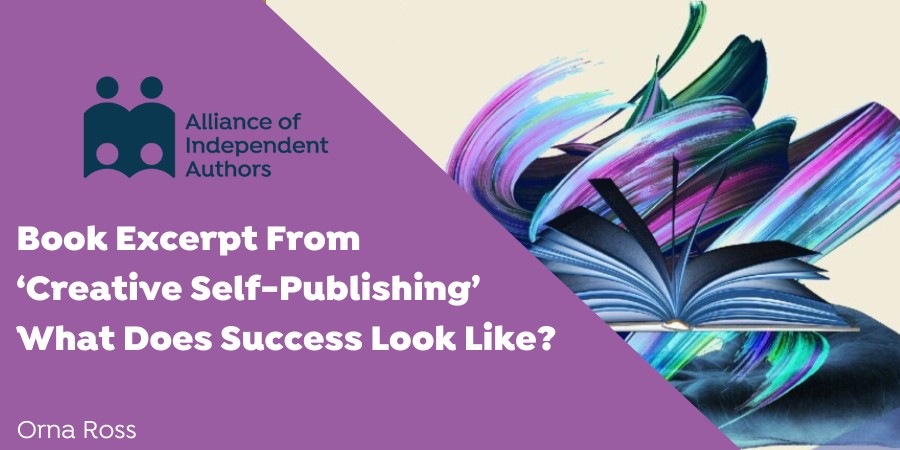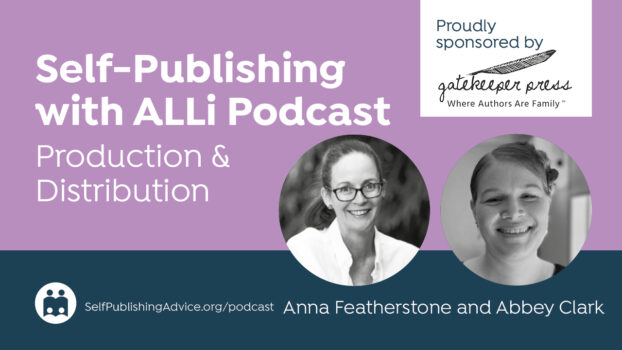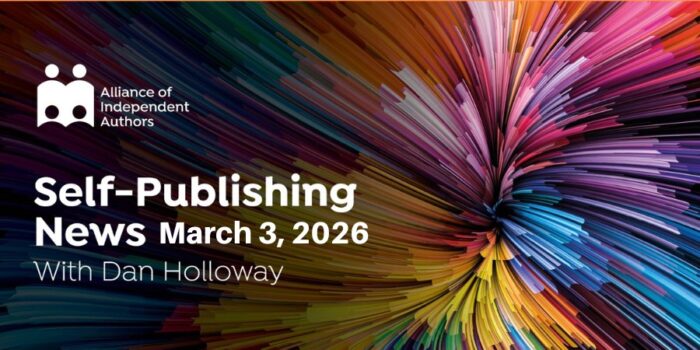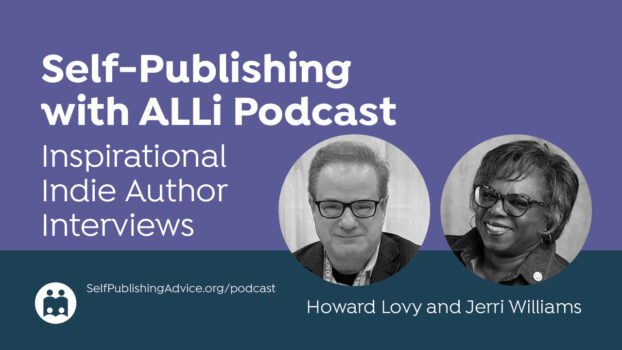Welcome to a new monthly feature on the Self-Publishing Advice blog, where we highlight standout titles from ALLi’s library of self-publishing guidebooks. This month, we’re featuring an excerpt from Creative Self-Publishing, written by ALLi Director and Founder Orna Ross. You can purchase a copy of the book in our bookstore, or, if you're an ALLi member, you can download this and all of our guidebooks for free in the Member Zone—just log in and go to “Publications.”

“Eventually, I got real, wrote the book, edited it a hundred times, found a publisher, got some actual media placements, and saw behind the smoke and mirrors of publicity and publication.” — Orna Ross
To create a book or a publishing business, you need to get clear about the specifics. What does success look like for you?
Poet Maya Angelou said, “Success is liking yourself, liking what you do, and liking how you do it.” Novelist Paulo Coelho said success “is being able to go to bed each night with your soul at peace.” The great non-fiction writer Samuel Johnson said, “No man but a blockhead ever wrote, except for money.”
When I started out in my twenties, like many aspiring writers with an overactive imagination, my definition of success was fame and fortune—I would become a bestselling and prizewinning author. I smile now at the mental conversations I used to have with imaginary chat-show hosts who were fascinated by my (not yet written) first book.
Eventually, I got real, wrote the book, edited it a hundred times, found a publisher, got some actual media placements, and saw behind the smoke and mirrors of publicity and publication.
Fame and fortune, when they finally came, were not at all how I’d envisaged them. Now that I’ve gone past bestsellerdom and prizes, I have three definitions of success that are quite different from the early, ego-fuelled dreams of my naive young self:
• To earn my living from writing and publishing fiction and poetry. For me, that’s success.
• To help other authors and creatives succeed. For me, that’s success.
• To play my part in the evolution of humanity to a more expanded and progressive consciousness. For me, that’s success.
Try This: Your Definition of Success
-
What is your definition of success? Is it lots of money? Extrinsic rewards like big cars, upscale houses and jewelry? Or intrinsic: independence, autonomy, personal growth? Is it the freedom, time and money to live where you like, doing what you most love? Is it inspiring or empowering or educating others? Or something else?
-
Where do you think this definition comes from? Why do these things spell success to you?
The compulsion to compare your accomplishments to others is an occupational hazard for indie authors, known in creative circles as “comparison-itis.” Whether it’s a negative or positive comparison is irrelevant. As an indie author, you are surrounded by authors who are doing better than you and also those doing worse. You see some doing extraordinary things: turning over exceptional amounts of money or inordinately impacting their niche, and others who seem determined to self-sabotage at the first sound of opportunity’s knock.
When comparison-itis threatens to take over, it is your personal definition of success that will sustain you. Another author’s way is not your way, and the more you are following your own true path, the less the doings of others will distract you—and the more your readers will love it.
Partly, this is about knowing your genre(s). Books fall into one of three broad mega-genres: fiction, non-fiction and poetry. I write across all three. Writers who stick to one genre, one category, one niche—or even better, one teeny-tiny micro-niche—have an easier time. Their readers know what they do and what to expect. One glance at their website and a new reader can tell whether their books are for them, or not. That’s what you want.
Alas, those of us who write all over the shop can’t help but indulge our multi-passionate natures. It makes us happy, deeply satisfies our creative impulses, and keeps us in flow. So that’s how we must go. With self-publishing, there’s room for us too—once we understand the extra work involved in marketing and promotion, and staying in touch with our own success measures.
Success Measures
In addition to your personal definition of success—which we’ll explore in more detail in Part VI: “Creative Business Planning”—there are universal measures for all self-publishing authors. The four key indicators of a healthy author publishing business are productivity, platform, profits, and pleasure.
Productivity: Your output, expressed as:
– Writing productivity: words drafted or self-edited
– Publishing productivity: books published
Platform: Your readership, influence and impact, expressed as:
– Reach: the number of readers, patrons and subscribers
– Engagement: the number of comments, messages, shares
Profits: Your financial rewards, expressed as:
– Business profits
– Personal income
Pleasure: Your personal satisfaction, expressed as:
– A rating from one to ten based on internal self-observation, one being misery and ten creative bliss—what I call your creative happiness quotient (CHQ)
In his book On Writing, Stephen King says:
“Writing [is] about enriching the lives of those who will read your work, and enriching your own life, as well. It's about getting up, getting well, and getting over. Getting happy, okay? Getting happy.”
“Getting up, getting well, and getting over.” King was referring to overcoming the alcohol and drug addiction he still regrets, decades on from going sober.
This is the difference between creative business and business as usual, which often sacrifices people for profits. Creatives value process as much as the end product. It’s not just what we do, but also how we do it. Measuring our personal happiness is how we stay connected to the how as well as the what—our process as well as our products.
The truth is that you are likely to have more than one definition of success. We contain multitudes. In one mode, our mind fancies money or fame. In another, it wants to show sniffy establishment types or the folks back home what’s what. In yet another, it wants to deeply affect a reader’s heart or mind.
All of these are the surface expressions of the deeper desire to connect—to connect with our readers, but also to connect with our own creative desires. Your publishing success is embedded in your writing motives—sometimes so deeply embedded, so natural and obvious to you, that you might not be consciously aware of it. As you connect the line of success from your writing to your publishing, and back again, you are forced into awareness.
Writer You thinks you’re writing for everybody, but Publisher You must choose a genre and a category for your book. Writer You needs to go into the creative cave to focus, but Publisher You is curious about other authors in your genre. Writer You might not like marketing, but Publisher You knows it’s a non-negotiable. Writer You is a perfectionist. Publisher You knows the work doesn’t need to be perfect—just good enough. Good enough at writing to please your readers. Good enough at publishing to persuade enough of them to buy. Good enough at business to give yourself, and your writing and publishing team, fair return. Writer You would be content to throw the work out into the marketplace and see what sticks, but Publisher You knows just how valuable reader attention is and wants to make the connection.
Success for an indie author is integrating the writer and the publisher in ways that feed and nourish them both. When it works, everything you learn as a publisher about who you’re doing this for feeds back into your writing, which further improves your publishing. Once in this benign loop, you grow clearer all the time about what you do and how you do it.
And making you happier all the time, too.
Publishing, like every creative field, is full of dreamers and posers, wannabes and pretenders—not to mention scammers and con artists—all of whom want the rewards without doing the work. They are all massively missing the point—and have the misery to prove it. Creative happiness is generated by meeting the challenges we’ve set for ourselves.
As we transform our experiences, sufferings and joys into words, then into books, then into reader communities; as we build our own self-penned and self-published body of work; as we increase our income and influence and impact, we generate many kinds of happiness—from humming contentment, to dopamine hits, to raptures of bliss. The more creative we are in how we write, publish, and do business, the more variety and intensity of happiness we’ll experience. There is no limit to how good this can get.
You may feel you are a long way off at this point, but it begins with caring less about the outside world—what others think and do—and more about your inner world, particularly the ideas and impulses you hold most dear. That’s how we achieve independence.
Thoughts or further questions on this post or any self-publishing issue?
 If you’re an ALLi member, head over to the SelfPubConnect forum for support from our experienced community of indie authors, advisors, and our own ALLi team. Simply create an account (if you haven’t already) to request to join the forum and get going.
If you’re an ALLi member, head over to the SelfPubConnect forum for support from our experienced community of indie authors, advisors, and our own ALLi team. Simply create an account (if you haven’t already) to request to join the forum and get going.
Non-members looking for more information can search our extensive archive of blog posts and podcast episodes packed with tips and advice at ALLi's Self-Publishing Advice Center.




